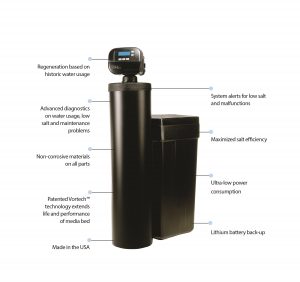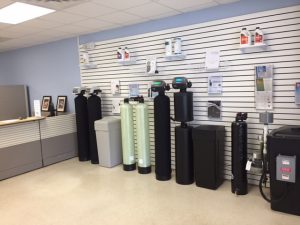A water softener removes hard minerals from water, like calcium, magnesium, as well as iron and manganese. These systems work continuously over time, which means they can wear out just like any other appliance. For homeowners who invest in these systems, the big question is: How long do water softeners last?
Most water softeners typically last 10 to 15 years, and some very well-maintained water softeners can last even longer. However, a water softener system’s life expectancy depends on several factors:
- Water usage: Homes with high water consumption may need replacement sooner
- Water quality: Extremely hard water or well water with iron can reduce equipment lifespan
- Maintenance: Regular servicing extends the life of the unit
- Brand quality: Some systems perform better under harsh conditions
Since there is no set schedule for when to replace a water softener, it’s important to know the signs of failure. For more information, continue reading.
Contact us at H2O Care for superior water softener systems and equipment service. Our water quality experts are here to keep your system running efficiently with reliable maintenance and repairs!
Signs of an Improperly Working Water Softener
Several things can indicate your softener isn’t working properly. However, before assuming you need a replacement, watch for these signs that your water softener isn’t working. Many issues can be fixed with simple repairs or maintenance.
1. White, Crusty Buildup Around Faucets & Pipes
Hard water minerals create chalky, white deposits known as limescale around:
- Kitchen and bathroom faucets
- Showerheads
- Pipe connections
Pay attention to the faucets when you’re cleaning the kitchen and bathroom. If you notice a chalky substance around them, this could be a sign that you need to take a look at your softener. Scale buildup indicates your softener isn’t removing minerals effectively.
2. Laundry Problems
Hard water makes clothes:
- Stiff and scratchy
- Fade faster
- Wear out quicker
If you notice any of these issues, your softener may not be operating as it should. You might also notice that you’re using more detergent and fabric softener to get clothes feeling clean and soft.
Fabric softener can help with stiffness, but a better solution is to ensure your water softener works well. This will remove the minerals that make clothes stiff, wear out the fabric, and prevent detergent from working properly.
Hard water can also damage your washing machine, dishwasher, and water heater. To protect appliances, it’s important to check that your water softener is always functioning properly.
3. Soap Won’t Lather
Hard water makes it difficult to create a soap lather. You’ll notice:
- Shampoo and body wash don’t foam well
- You’re using more soap products than normal
- Cleaning becomes more difficult
If you find it hard to lather up in the shower or at the sink, check your water softener.
4. Water Tastes Different
Many people can taste the difference between hard water and softened water due to increased mineral content. If your tap water suddenly tastes more metallic or mineral-heavy, your softener may need service.
Repair vs. Replace: What to Consider
Not every problem means you need to invest in a water softener replacement. Common fixes include:
- Adding salt to the brine tank
- Cleaning or replacing valves that become jammed
- Replacing resin media inside the tank
- General cleaning and maintenance
Our water experts at H2O Care can diagnose the issue before you decide it’s time for a new softener. When replacement is necessary, our team will help you choose the best system for your household’s needs. Contact us today to schedule a water test and service appointment.
Benefits of Getting a New Water Softener

High Efficiency Water Softener
A few advantages of replacing an old water softener are:
- Marked improvements in efficiency
- Reduced salt requirements
- Less water is used in the backwash cycle
- Computerized systems learn your water usage patterns
Modern systems use advanced technology that enables you to program them to your needs. This includes system operation for your incoming water quality and monitoring volume usage, making them very efficient in terms of both water and salt usage.
A properly functioning water softener provides immediate benefits you’ll notice, like:
- Cleaner dishes without water spots
- Softer clothes that last longer
- Better lathering from soaps and shampoos
- Softer hair and skin
- Better appliance efficiency
- Easier cleaning throughout your home
If you have hard water that isn’t being properly treated, you’ve likely been dealing with common water problems like those mentioned earlier in this article.
For more information on hard water, see the link at USGS Hard Water.
When To Call a Professional
You should schedule a water softener inspection if you notice multiple warning signs or if your system is:
- Over 10 years old
- Requiring frequent repairs
- Not responding to basic maintenance
Water softeners are reliable workhorses, but they don’t last forever. By watching for warning signs and maintaining your system properly, you can maximize its lifespan and ensure your family always has quality water. When replacement time comes, modern systems offer better efficiency and performance than ever before.
If you’re unsure whether or not your softener is operating properly, contact H2O Care today. One of our water treatment specialists can test your water and tell you whether repair or replacement makes the most financial sense. With 30+ years of experience and cutting-edge equipment and technology, you can depend on our in-house experts. Our services are always performed by trained water professionals.


